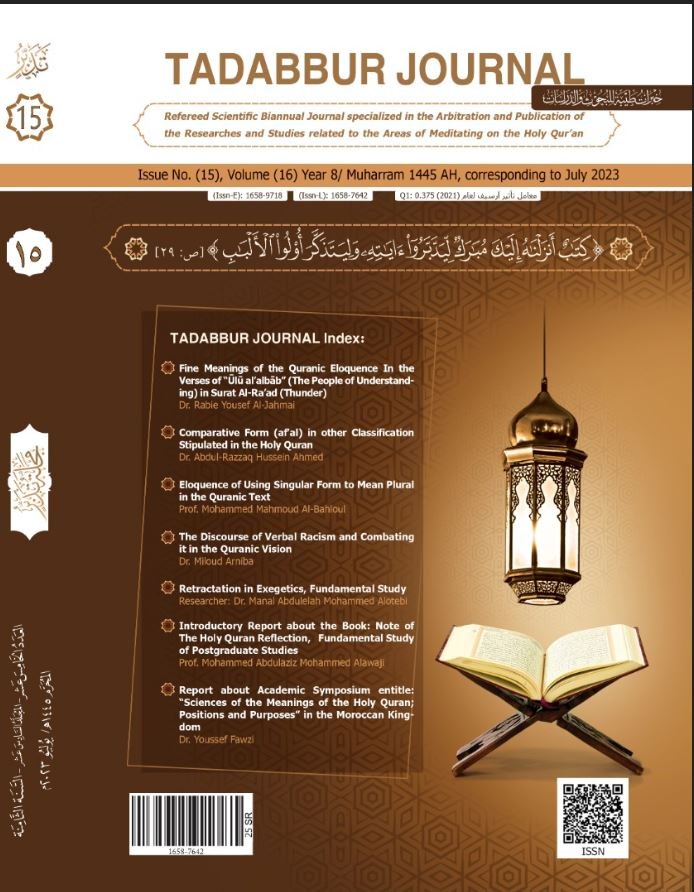research Fine Meanings of the Quranic Eloquence In the Verses of “Ūlū alʼalbāb” (The People of Understanding) in Surat Al-Ra’ad (Thunder)
Main Article Content
Abstract
Fine Meanings of the Quranic Eloquence
In the Verses of “Ūlū alʼalbāb” (The People of Understanding) in Surat Al-Ra’ad (Thunder)
Dr. Rabie Yousef Al-Jahmai
Associate Professor of the Holy Quran and its Sciences
Department of Islamic Studies
Tabuk University
Abstract
No doubt that the fine meanings of the Quranic Eloquence are endless as an extended ocean with no coasts. Contemplating these meanings helps to identify some aspects of the Quranic inimitability and a great reason to act with its guidance. The current paper is an attempt to reveal some of the fine meanings of the Quranic Eloquence in talking about “Ūlū alʼalbāb” (The People of Understanding) in Surat Al-Ra’ad (Thunder); stating their significant features, great position, reward in the afterlife, as well as clarifying the words of these verses and their contexts of fine meanings.
The study revealed the following findings: “Ūlū alʼalbāb” (The People of Understanding) are those with perfect faith, clear insights, the pure hearts, and minds free from every blemish and turbidity. In addition, the fine meanings of the Quranic Eloquence in talking about “Ūlū alʼalbāb” (The People of Understanding) in Surat Al-Ra’ad stated their high position and honor by Allah (Glory Be to Him), and perfect characteristcs. The verses showed the great reward awaiting for them in the afterlife and Allah’s generosity with them. If there are no verses in the Holy Quran mentioning “Ūlū alʼalbāb” except for these verses, they would have been enough to show their honor and dignity.
Keywords: Fine Meanings – Quranic Eloquence - “Ūlū alʼalbāb - Surat Al-Ra’ad
Downloads
Article Details
Conference Proceedings Volume
Section

This work is licensed under a Creative Commons Attribution-NonCommercial 4.0 International License.
Indicating to the intellectual property, copyrights, and open access right:
According to the Budapest Initiative 2002; tadabbur Journal, which is issued by Khibrat Taibah For Research and Studies in Medina, provides free open access to its publications, and applies the Creative Commons license:
Attribution- Non-Commercial 4.0 International (CC BY-NC 4.0) for the works it publishes from peer-reviewed scientific research and reports, which are freely available on the Internet, and which allows any user to read, download, copy, and distribute (Convert), print, search, or create links to the full texts of the journal’s research and publications, and analyze them in an automatic manner for discovering them, sending them as software data, or using them for any other legal purpose, without financial, legal, or other technical barriers beyond those related to Internet access.
It also highlight that the only barrier to reproduction and distribution, and the only role of copyright in this field, is the necessity of granting the authors of the journal’s research and reports and the publisher the journal; Control over their works, and the right to official recognition and reference citations.





